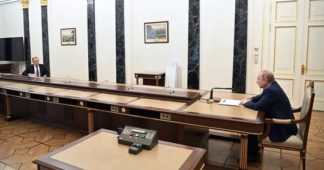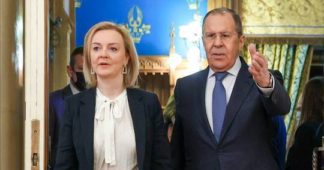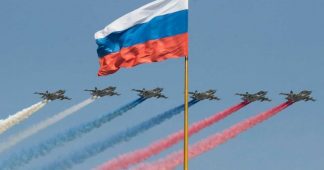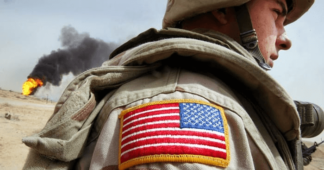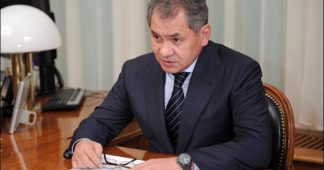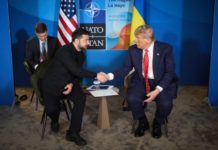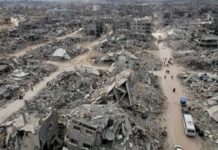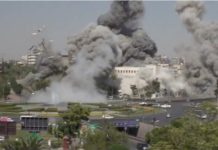By Kassandra Vernyhora
Trying to answer to the question about possible scenarios concerning the development of the situation in Ukraine, it is first necessary to agree on the real causes and goals of this war, which has been thoroughly clouded by the smokescreen of massmedia propaganda, political demagoguery, blatant lies and shameful cenzsorship. Therefore, I make the following assumptions. For the Russian side the main objective is the reaction to what Russia perceived as the direct existential threat to her statehood. To use a well-known american cliche : the case of clear and present danger.
So perceived, Russian action is an attempt to assure security of the state against constant agressive NATO expansion toward her boarders. It is plaussible that this objective which after 2014 (and especially after the unequivocally negative reaction of the West to Russia’s periodically repeated demands for the establishment of clear, solid and credibly assured rules of mutual security guaranties – demands, let me underline, allarmingly renewed at the turn of 2021/22) could not be achieved without embarking on the risky direct military intervention in Ukraine. Therefore, developments which unfoleded in Ukraine after February 24th could not have been surprizing, as they happened exactly according to what had been stated beforehand, in the warning firmly voiced by the Russian president and repeated by his aids. Whatever the West’s reaction should be, he said, in any case Russia will secure its objective accordingly, one way or another: that is to say either by diplomacy or – in case of the absence of western cooperation – by other means available (a message that could not have been misunderstood by professional diplomats which nevertheless was then repeated several times in plane language for everybody to grasp easily : « if need be, we will do it by force »). It seems, the Russian government became convinced of this situation at the beginning of this year at the latest – after multiple attempsts of its diplomacy and direct meeting of the head of the Russian state with some of his western counterparts to convey the message proved futile – and then it began to react according to what it believed was the West’s implacable, unrealistic and unacceptable position.
The last-minute diplomacy of January and February did not and could not help, because the decision makers representing the West – all of them PR talk type of politicians a la Macron, immunized to reality and lacking genuine intellectual and political independence – remained in the world of fiction, perfectly fenced against any logical and material argument. They assessed the reality and its possible consequences through the prism of their own pious wishfull thinking, collectively shared missperceptions and erroneous beliefs in which they enforced each other. Group thinking has suplanted any authentic understanding, so needed in this demanding moment of history.
My second assumption is concerning the western (i.e. USA’s) point of view. Both from open declarations as well as hidden, but nonetheless legible motives it can be surmised that from the american perspective the ultimate aim of this war is calculated for the maximum weakening and – should a favorable opportunity present itself – the complete destruction and, consequently, subjugation of Russia. It is certainly not about Ukraine alone, its independence, “democratic future”, “belonging to Europe” or other such fictions, the sole purpose of which is to confuse the so-called international community and public opinion. In this conflict, Ukraine is just a means to the overarching goal, which is to cause the greatest possible economic, political and military harm for Russia. The US government is not even trying to hide this. What is only hidden is the extent to which Washington is ready to get directly involved in the current fighting with its armed forces. Just like Poland for the USSR in the 1980s, Ukraine became the weakest point in the local balance of power for neighboring Russia, the most susceptible place for a strike ; deliberately selected place softening and probing of which could eventually lead to the collapse of the country targeted as an object of this subversive operation, i.e. of Russia itself. This softening operation began well before the fateful final months of 1991. At the end of that year it was made possible by the formal separation of Ukraine from the USSR and the subsequent dissolution of the latter. These processes of probing and softening increased in intensity in the following years and ended in two Kiev raids (« orange revolution » and « euromaidan »), each of which brought the USA closer to their desired goal.
Since the overthrow of Yanukovych through a de facto coup d’etat, Ukraine has transformed from a buffer country into a bulwark for future American covered actions and eventually into a frontier country of open diversion and anti-Russian aggression led by the CIA and the State Department whose functionaries could hardly abstain themselves from bragging about that, using forms of verbal expression far removed from recognized diplomatic standards. Extremist elements were deliberately allowed to power in the newly « independent » CIA-overrun country with double goal of creating a new Ukrainian national identity built in opposition to Russia, and even turning the entire real into a sort of « anti-Russia », as well as preparing a Western foothold for a future strike.
At the same time, socio-cultural processes were taking place there, the aim of which was a hasty and superficial “Europeanization”. A new and « Westernized » Ukraine was to be created in line with the decadent fashions of the latest times. In the past, the introduction of the culture of tittytainment in all of the countries of the « old Europe » proved extremely successful, as it facilitated the imposition of a network of soft but near perfect and all-embraceing means of social control which in turn allowed effective pacification and neutralization of large social masses. Thus, the stupefied large masses of society have been rendered powerless, permanently excluded from the processes of political decision-making which were left to the exclusive discretion of the hidden oligarchy and its elite.
Also in Ukraine a swift success was achieved in this field, which however quickly turned into a failure during the outbreak of the military conflict, as the start of war has forced several millions of the most active, capable, relatively prosperous and mobile citizens of Ukraine to flee the country. Introduced by Zelensky on February 24, 2022 the administrative ban on leaving the country, in theory obligatory for all men age 18-60 able for military service, turned out to be completely ineffective. After all, Ukraine had for years been a crippled, fallen state, completely devoured by corruption, which after the outbreak of war hostilities became a field engulfed by anarchy, anomy, demoralization, brutalization and common banditism (according to reports from people involved in delivery of help for war victims, convoys with humanitarian aid were detained and robbed on roads by armed gangsters). No wonder that after the outbreak of the conflict Poland alone – according to data published by the Polish state border service – accomodated over 600,000 such men. So, even if a majority of all the refugees who crossed the Polish boarders (there were more than 3,6 million of them reported by frontier guards) were women and children, there was also a substantial number of ablebodied men among them. Formally forbidden to flee, men who have purchased in various ways their way to freedom from war were representing the upper, upper middle and middle layers of society. It turned out again that the forgotten victims of the war most often are the weakest and the most defenseless: old and poor people left to their fate in bombed-out cities and burned-down villages, while the strong, richer, more resourceful simply fled. As a result, in Poland in short time practically all thus far unoccupied apartments for rent did suddenly disappear from the market and rental prices drastically increased. It happened even in provincial, small towns, while at the same time in up-scale locations of big cities, Warsaw, Cracov, etc. expensive cars appeared on Ukrainian licence plates in large numbers.
Extending the war indefinitely
It is in the interest of the West (at least of the USA and US agents in Europe) to extend this war, not to shorten it and to allow a truce or peace. It was caused, inter alia, by an effort to consolidate the recently extremely polarized US society, which has not experienced such a radical split since the war with Vietnam – and perhaps even the Civil War – that has essentially resulted in the emergence of « two nations » with intransigent hostility towards each other. As it can be ascertained from the tendency visible in a series of recent opinon polls in the USA, this objective will not be fulfilled. The rate of approval for the senile president is at its lowest levels. However, the war in the East was also meant to compensate America’s injured pride for its humiliating defeat in Afghanistan and to increase the ability for action in the Middle East. The question whether these objectives could justify the thousands of deaths and enormous human suffering can only be answered in one way : absolutely no.
But most importantly this war permitted the USA to instantly incapacitate Europe by taking almost direct control of its governments and the central institutions of the European Union, thus creating conditions for an unprecedented economic US dominance over almost the entire continent. This was the only impressive and astonishing Blitzkrieg of this war so far. The ease with which Washington emasculated almost all European states tells a lot about the form of relationship biding allied countries as well as about the format and quality of the current European leadership. The USA, the economically and socially crippled military hegemon, gradually pushed from Latin America, systematically ousted from Asia and eliminated by China from Africa, found the last life supporting drip in Europe – a new source of nourishment and a chance to reinforce the insatiated giant before a possible crackdown with Russia, which in turn would give them strength and energy, and equip them in a better strategic position for the inevitable future confrontation with China.
The first casualty of this war, apart from the ignorant Ukraine, was the globalization and the unipolar world. It can therefore be said that, paradoxically, the West destroyed the order that it had been building successfully since the end of the 1970s and whose construction accelerated after the collapse of the USSR and the breakdown of the Eastern Bloc. It could be – from the selfish perspective of the West – a price worth paying, if the reward were to be a new unity achieved by taking control of the resources of Russia and China. This, however, is hardly a done deal. Nonetheless, tens of thousands in Ukraine paid the ultimate price for American rehearsals on geopolitical chessboard. And nobody knows how many more accidental lives in how many more countries will have to be condemned to extinction and thrown to dumpster before the game is over.
The return of the cold and then hot war was therefore essential to the realization of the opportunities for a truly unipolar world, i.e. not only a world without any structural alternative – with neoliberal capitalism spread globally – but now a world under full political, military and economic control from Washington: not just one system across the globe in several, relatively independent regional versions (US-European, Chinese, Russian, etc.), but one global universe with oversight from one center of control. And this would necessarilly mean one global world ownership and domination. It could not be achieved without a massive war, unless it was possible to weaken each of the opponents in turn, or to disarm and surrender them one after another. Operation Ukraine is an attempt at the final solution of that sort and magnitude, or rather an introduction to it. It is not a conflict between Russia and Ukraine, not a clash of an imperial might with a nation-state, even if there is an element of that in it too. Ultimately, it is a contest over world domination and in such a ramification it may be seen as a proxy war between two nuclear superpowers – a declining hegemon and an aspiring upstart regenerated thirty years after its self-inflicted downfall. For the time being, however, we will all vegetate in a world which is in a state of permanent turmoil, sharply divided, hostile and unpredictable, under constant threat of annihilation.
Not everybody, however, will be afflicted with this disease in the same way. For the same reason that makes the West slowly forget about Ukraine, no one in the West will be acutely hurt by the possible spill-over of this conflict to other countries in Eastern Europe, in particular the former Soviet Baltic republics and Poland, despite alliances and EU membership. Their membership of the EU and NATO does not change anything here, because the military conflict is governed by its own logic – the logic of confronting forces, the balance of forces and means, as well as confrontation of resolve, stakes and determination. At least in the latter Russia seems to have an edge. As far as Lithuania, Latvia and Estonia are concerned, from the military point of view they are currently indefensible by the West. Poland is a special case in this sense that the shocking irresponsibility displayed by her ruling elite proves that history tends to repeat itself. One is tempted to conclude that, the eventual reintegration of the arrogant, self-righteous, bossing everyone in Europe and unruly Poland again into the sphere of Russian influence would not sadden anyone in the old EU. On the contrary, these countries would be more than happy to get rid of their troublesome and ungrateful partner who has become a US vassal and the destructor of a European community based on the domination of the old colonial powers. A destructor who did not get rid itself of the anachronistic Promethean dreams of a renewed alternative construction of geopolitical forces in Europe, with Poland as the main local hegemonic player within the « Three Seas area », which would dislodge the decadent old Europe, take its role and place, and breathe new energy into the Euro-Atlantic strategy.
The violent return, after short years of respite, of the bipolar world with its new-old divisions, running roughly along the lines of the ancient frontiers – the iron curtain – is not only possible, but it is becoming reality in front of our eyes. However, in contrast to the terms imposed on them the day after World War II, for some political entities in this area (especially Ukraine, Lithuania, perhaps Poland) it may even mean complete non-existence, loss of sovereignty, independence or statehood. Not only this. Some peoples may find themselves again in the place which they thought to have happily abandoned for good some 30+ years ago, but this time they will be back there without so ridiculed, though not entirely worthless, « brotherly friendship » or protection extended to them earlier. And this time history may repeat itself under much less hospitable conditions than they ever felt before – namely the conditions of hostile dependency on enemy state.
A Western strategical success ?
Some politicians from Europe, especially from the eastern part of it, try to convince themselves and all of us about the West and all the world’s unity in the opposition to the war waged by Russia. It is heralded as West’s first great achievement, sign of resolve and the promise of imminent success. And yet non other veteran of western politics than the former UK labour prime minister Gordon Brown recently reminded us – speaking not in defence of Putin, but, on the contrary, chastizing the states not subordinated to American conducting and not playing the music as desired in the Pentagon – that as many as 82 countries around the world still refuse to support any penal action aimed at Russia, and 150 countries did not impose sanctions against this state. Among these countries – a well-known fact – are the two most populated realms in the world, China and India, which between themselves have close to 3 billion peoples. That is almost 40% of the global populace standing today at 8 billion. If we add to these numbers only a handful of Asian states most of which distance themselves from the belicose NATO posture, not to mention the majority of African states as well as some largely populated countries in Latin America, it will become immediately evident that it is the West who is in minority. It is only owing to our habitual tendency to assume, and impose on the rest of the world, the West-centered perspective that we can speak in the name of the entire world allegedly opposing Russia.
As we know, even among the EU and the NATO member states there are significant differences on this subject, and while lip service is paid to the commonly declared policy of sanctions, a stream of money is flowing and commodities essential for western economies are being exchanged between Russia and the West. So much for the so-called western unity and world unanimity in favor of punishing Russia.
Yet, from the Western perspective, the results of the war so far are presented as partially satisfactory and promissing. Russia was pushed into a war that binds its military forces, limits its actions outside the area of the current conflict, weighs it down economically, weakens it politically and economically, tearing up the existing network of economic cooperation. Moreover, despite hard-won military successes, Russia is still losing this war in terms of image and PR, at least in the West. This is a direct result of the effective political control over the media coverage in Western countries and the still significant position of Western media in the world, and partly also the effect of the ineptitude in using propaganda on the Russian side as well as of the dominant fashion in the Russian and Chinease media of aping the West, using western blueprints, which in itself is a sign of cultural dependency.
Westerners, who in their mass have no interest in anything other than the selfish and hedonistic freedom to use life and maximize satisfaction, who could not care less about Ukraine or all of Eastern Europe, including the newly joined post-2004 states of the Union, when asked about this war, will still respond with moralistic indignation, according to the ready-made pattern given to them by their dominant propaganda outlets. They have not yet felt the full blown negative consequences of this war: after the pandemic hiatus, airports and low-cost airlines are operating again (though not without growing difficulties), the fun and party are back in Ibiza, as well as in the clubs of Berlin, Paris or London. Gasoline is still more expensive than it should be, but by now nearly everyone in Europe “understood” that a diesel engine run car is an archenemy of ecology, welfare and good life.
On the other hand, the boost of new power that the pseudomoral, belicose mobilization has given America – like a drug – will only suffice in the short term. With passing time, the serious economic, social and political problems, which have been accumulated and ignored over the decades, will deepen yet more. Western Europe, to which the gigantic parasite from overseas has attached itself, will not be able to drag much longer the ballast of its limping economy, additionally burdened by the growing costs of American gas, skyrocketing prices of energy bought on the spot, as well as American dictate and exploitation. Needless to mention the real threats of food supply shortages, growing inflation, rising of basic costs of living, joblessness and general deterioration of living standards. All of that on the top of already near calamitous conditions of western economies and societies.
Meanwhile, China, India, South Africa and Brazil, with some of their neighbours or allies, will start to create an alternative space for economic exchange, which will continue to dislodge American institutions, led by the dollar, payment and money tranfer systems, investment banks, stock exchanges and US rating agencies, from the central role in the global economy.
Pushed into an autarkic economy, Russia will inevitably develop new, unused capabilities and opportunities, and when incorporated into the system of alternative connections, it will weaken its current economic partners from Europe, which will also indirectly weaken the USA. This is already noticed by the circles of Western elites associated with traditional capitalism (see the speeches of Kissinger, Luttwak and others). Until recently, the responsible economic circles in the West were sensitive to the slightest signs of possible political turmoil in the markets, which could harm business and threaten the fragile social stability as well, and for this reason they strongly opposed too far-reaching attempts of states to intervene in the turbulence-sensitive matter of economic life.
Meanwhile, in recent times, an incredible thing has happened: for what once would have been considered a sad but rather unimportant matter – a defense of a failed and corrupt peripheral state whose location on the map is a mistery even to the educated in the US and many in western Europe – the United States and its supporting European allies have thrown the entire Western economic sphere (and due to its international importance, a huge part of the rest of the world) in the epicenter of an unprecedented economic, political, demographic, social, energy, food and military earthquake, the repercussions of which spread like a tsunami around the entire globe. Until now, even the appearance of a risk of the single crisis – food, migration, energy or whatever – would encourage governments to at least try to simulate some remedial measures, so as to pretend they really care. In sharp contrast, for some time now, we have been dealing with the unprecedented irresponsibility displayed by the political elites, which not only cannot foresee the inevitable consequences of their own actions or omissions, but willfully aggravate the problems by making utterly irrational and catastrophic decisions.
War to the last Ukrainian or war to the last human being ?
The West can and most likely – until the balance of power in the US remains unchanged – will continue sending weapons to Ukraine, including long-range missiles, in order to keep up the fire of the conflict lit in February 2022. The US will not speak loudly about it, and if accused, it will probably firmly deny, as the practice of outright lying has been their constant modus operandi for decades. At some point this escalation of the conflict will necessarily lead to Russia sending a strong warning signal to the West. Ultimately it may take the extremely ominous form, i.e. striking one of the EU countries with powerful conventional or even tactical nuclear weapons. From the Kremlin’s point of view, the most convenient targets would probably be Lithuania or Poland. On the occasion of sending to the West a meaningful message – « no more jokes, gentlemen » – Russia would punish its most die-hard denunciators, thus killing two birds with one stone. Polish and Lithuanian societies would again pay a dire price, disproportionate to the phantom profits which their notoriously imprudent or dependent local politicians dreamed of.
However, in the case a further extension of war and NATO countries engagement becomes inevitable, acting under perceived or real risk of direct existential threat the Russians may consider – as one ot the means of last resort – making a limited use of mass destruction weapons against one of the western european countries. It is not inconceivable, for instance, that they would target a selected large city, trying to deliver in such a shocking way the last wake up call to western leaders to reconsider their uncompromising position before matters go beyond the point no salvation. It would also be a way of manifesting the real stakes of this conflict as well as delivering a clear message that its theatre will not be limited to the lands of eastern Europe alone. Given the leading role played by UK’s government in the attempt to defeat Russia, selection of targets located in Great Britain seems possible. In any case, signaling this possibility will certainly be used by Russia in its psychological war with the West.
Looking from the Russian perspective, it does not help the Kremlin to end the war at the present stage. Yes, its price is high – the sudden cut off of Russia from the West, the unprecedented scope of economic sanctions, or more precisely, the economic war declared to Russia by the US, the consequences of which will include hoped for and possible internal eruptions of social discontent in large cities – however, sudden interrupting of military activities and attempting to negotiate at the present stage would not guarantee anything, and the unsatisfied need for security left to the future could only increase the total cost of the unsuccessful and aborted operation.
Ukraine, with its current political power center preserved, will never recognize in good faith the annexation of Crimea, the return of the Donbas and Lugansk districts to Russia, and even less the seizure of a part of the Black Sea coast. In turn, for Russia, taking only part of the coast and leaving Odessa, or Kharkov and even Dniepropietrovsk and Krivoï Rog, to Ukraine is hardly an unacceptable option. On the other hand, left in so helpless position and with such an intransigent power, Ukraine could not change its political orientation and would not abandon the strategy that had led it directly to its unenviable predicament and to the war. Though this war was not about Ukraine’s independence, it is likely that – apart from the massive loss of life and material damages – the attempted total separation from Russia and independece of Ukraine will be its first victims.
Therefore, it seems that the most desirable scenario from the Russian perspective involves the incorporation of at least the lands that have already been taken over, the extension in both directions of the coastal strip thus making Ukraine a land-locked country, permanently cut off from the sea, deprived of the surrounding area, with the possibility of taking over further lands of the so-called Novorossiya together with the elimination of the political center in Kiev. So truncated Ukraine, left only with the Galician parts, never in the past belonging the Russian Empire, or extended even to the vicinities of Vinnitsa would certainly change the rules of the game in Europe. This is, of course, the maximum goal (if we ignore the complete annihilation of Ukrainian statehood, which cannot be ruled out), which can be broken down into several stages. The minimum goal – neutralization of Ukraine – was achievable before the coup that overthrew Yanukovych and – perhaps – even after 2014 and after the successful implementation of the Minsk arrangements (which did not happen), but now – due to Russia taking over ¼ of the territory of Ukraine and with the functioning of the current political center in Kiev (that is, with the unchanged position of the USA) – it is no longer possible to achieve.
The next possible point of a truce that could be acceptable to both sides, given the return of common sense to all parties involved, would be the neutralization of Ukraine without returning to the status quo ante, but that would require America to abandon its original or hidden goal and turn its policy 180 degrees, thus removing the Kiev team from power. That would of course involve the abandonment of the irrational drive to expand NATO everywhere, from the Caucasus to Scandinavia. At the moment, pressure exercized on the US government from some of its oligarchic elites seems to be too weak (or perhaps just too discreet). We don’t know what goes on behind the scenes of official and formal power. As the recent and more removed past show (Afghanistan and Vietnam), a radical shift in US policy is not impossible, and who knows if Kissinger’s unexpected appearance with the enigmatic message for Davos gathering was a sign of the covert oligarchy’s desire to take the first step in this direction. However, also this solution – as seen from the Russian perspective – bears the disadvantage of lacking hard guaranties of sticking to the promissed word.
And as we well know, NATO has a serious problem of credibility, especially when its promisses to Russia are concerned. Left without a clear solution, the problem with the Ukrainian rebellion and its self-assertion as an anti-Russia could return with a vengeance in the coming years, and waging another war for the same purpose or conducting a war in installments would only increase all its costs and weaken Russia, giving it nothing in return. Whether we like that or not, it can not be forgotten that in this conflict Russia is one of the main players, not just an accidental participant, bystander or a pawn. It has its autonomous and to a large extend undisclosed and yet not declared aims. Thus the terms and time of the conclusion of war will depend on its decissions and abilities to carry on. Russia seems to have no other option than sticking to the timetable of its own design. It could be forced to abandon it if the opposing side prevailed, but given the ulimate trump card in its hand – the credible threat of the use of weapons of mass destruction as its last resort – this possibility seems implausible.
Yet another immaginable option could be materialized itself through ascention to the independence of the military command in Ukraine from the straitjacket of its maximalist political tutelage and the removal of the Kiev regime, but in the face of the near disintegration of the Ukrainian armed forces and destruction of their combat capability, it seems unlikely. If so, the indefinite continuation of hostilities would appear a forgone conclusion. The matters may have reached the point of no return, and there may be no alternative to extention of the fighting to the very end. The following questions in that case remain open : Would it be a sufficient, decisive and acceptable end just to pacify or take over Ukraine alone by Russia ? Or maybe what it would take is the restauration of the Russian sphere of influence in Eastern Europe and the new divison of the globe? Or perhaps nothing short of the full blown World War III until its unpredictable final result will do?
We remind our readers that publication of articles on our site does not mean that we agree with what is written. Our policy is to publish anything which we consider of interest, so as to assist our readers in forming their opinions. Sometimes we even publish articles with which we totally disagree, since we believe it is important for our readers to be informed on as wide a spectrum of views as possible.
